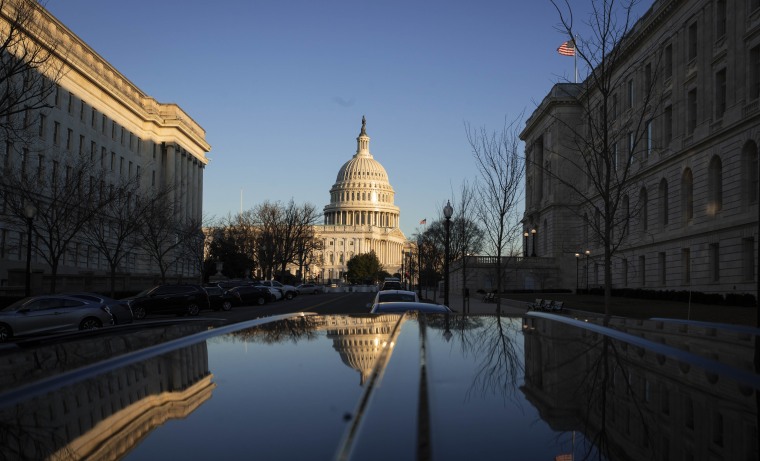WASHINGTON — The biggest question looming over Capitol Hill as Congress embarks on its final legislative sprint of 2021 is whether the Senate will pass President Joe Biden’s $1.7 trillion economic safety net and climate bill.
When senators return Monday, they'll have two weeks to meet their self-imposed Christmas deadline. And it could all hinge on centrist Joe Manchin, D-W.Va., the linchpin of the 50-50 Senate.
"We have basically 49 of us in agreement to move forward. So we have one colleague we're continuing to work with, and he's been successful at making a number of changes. And so hopefully he'll be joining us," said Sen. Debbie Stabenow, D-Mich., a member of the Democratic leadership.
Democrats have shaped much of the current version of the bill around the demands of Manchin, who represents a ruby-red state that Biden lost by 39 points last year. If he bolts, the package collapses. And Republicans are pulling out all the stops to try to turn him against it.
Manchin and Biden plan to speak by phone on Monday afternoon, a source with knowledge said.
Before the call, Manchin didn't say if he's ready to vote on the legislation, acknowledging that "people have been in a hurry for a long time to do something," but that unfolding events can inform Congress to write a better bill.
"Whatever we're considering doing — or whatever Congress is considering doing, they should do it within the limits of what we can afford," he told reporters, saying that the bill should ensure "the wealthy pay their their fair share."
Republicans are solidifying their advantage ahead of the midterm elections next year as Biden struggles to revive his popularity. But the Build Back Better legislation is a rare political bright spot for Democrats: It remains popular among Americans.
A Monmouth University poll published last week found that Biden's job approval rating had sunk to a low of 40 percent but that his safety net bill enjoyed 61 percent support — largely unchanged since June.
Democrats have branded the bill as an antidote to pocketbook concerns, most notably inflation.
"No. 1, this is about lowering costs for people that have been out of control for a long time. On top of the list of prescription drugs and child care and so on," Stabenow said.
Republicans have sought to sway Manchin by requesting a Congressional Budget Office estimate of a revised version of the Build Back Better bill. The CBO estimated that it would add $3 trillion to the deficit from 2022 to 2031 on an assumption that all temporary programs will be extended without being paid for, although the current version does not include extensions for the provisions.
Sen. Lindsey Graham, R-S.C. the ranking member of the Budget Committee, said the analysis is proof that the bill is "a budget gimmick," predicting that none of the programs would end.
Senate Majority Leader Chuck Schumer, D-N.Y., dismissed the assessment as a "fake CBO score," noting that Biden and Democrats have pledged to pay if any programs are extended in the Build Back Better legislation.
Meanwhile, Congress must lift the debt ceiling by Wednesday and pass a massive defense bill this month. The main obstacles have largely been lifted.
The House plans to vote to refer former White House chief of staff Mark Meadows for criminal prosecution for defying a subpoena, as the Jan. 6 select committee dials up its investigation of the Capitol riot. In anticipation, Meadows sued House Speaker Nancy Pelosi, D-Calif., and the panel, asking a federal court to block enforcement of the subpoenas issued to him and to Verizon for his phone records.
Manchin's concerns
The House passed the Build Back Better Act last month, but the Senate will have to change it to win the votes of all 50 Democratic-voting senators.
The $80,000 cap for federal deductions for state and local taxes is expected to be diluted, and guaranteed paid leave is likely to be removed to draw Manchin's vote.
A tax credit for electric vehicles made at unionized factories also faces resistance from Manchin.
And Senate leaders have decided to remove a nicotine tax, which applies to vaping products, from the House version after some opposition, including from Sen. Catherine Cortez Masto, D-Nev.
"We are looking at ensuring that we are not increasing costs and taxes on anybody making less than $400,000. My concern is this is a regressive tax that's going to impact the very people in my state that we're saying that we're not increasing costs for," Cortez Masto said in an interview.
The Senate parliamentarian still has to decide whether other measures, including provisional work permits for millions of people in the U.S., comply with the rules governing reconciliation, an arcane budget process that allows certain bills to be passed with a simple majority.
Over the weekend, the Senate's Finance and Health, Education, Labor and Pensions committees released an updated text of their sections of the bill. Finance Committee Chair Ron Wyden, D-Ore., said they will hold bipartisan meetings with the parliamentarian — where Republicans can challenge provisions — over the coming week.
Some Democrats say the party should disregard the parliamentarian's advice and include the policy anyway. Manchin rejected that last week, saying he intends to "stick with the parliamentarian."
Schumer set a deadline of Christmas to pass the bill in part because Democrats fear that the onset of the 2022 election year will make lawmakers more nervous about passing an aggressive piece of legislation.
But there's also a tangible deadline. The $250 to $300 monthly per-child cash payments for parents, which Democrats passed in the American Rescue Plan, end this month, unless they are extended. The Build Back Better Act would extend them for one more year.
"We've got to find the highest priorities we have, make decisions and move from there," Manchin said Monday. "I'm happy to talk to anybody and everybody. I've been very open."


